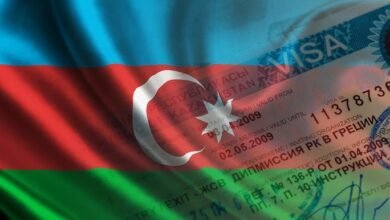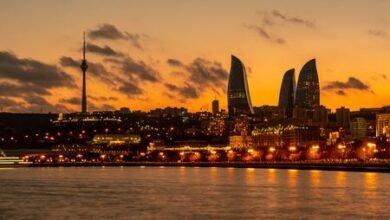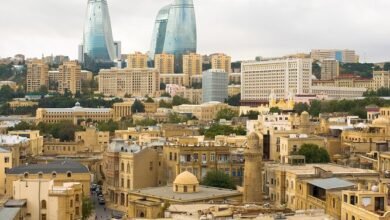
Caspian Sea Beaches in Azerbaijan: A Guide to Relaxation and Adventure
The Beauty of the Caspian Sea and Its Beaches
Picture a coastline where calm waves meet long stretches of sand. The Caspian Sea beaches offers a unique place to relax, have fun, and enjoy beautiful sunsets. Its beaches are perfect for everything from swimming and water sports to simply spending time by the water.
Why the Caspian Sea Matters
The Caspian Sea has been important for centuries. Located between Europe and Asia, it has shaped trade, travel, and cultures across the region. Visiting its shores is a chance to explore a mix of traditions, history, and nature all in one place.
Why Choose Azerbaijan?
Azerbaijan has some of the best beaches along the Caspian Sea. Here, you’ll find great spots for relaxation, family fun, and adventure. Whether you’re planning a quiet getaway or looking for exciting activities, Azerbaijan’s Caspian beaches are an ideal choice.
Which countries have beaches on the Caspian Sea?
The Caspian Sea, the largest lake on Earth, is bordered by five countries, each offering unique beaches and coastal experiences.
Azerbaijan

Azerbaijan boasts some of the most accessible and well-developed beaches along the Caspian Sea. The coastline stretches from the Absheron Peninsula to the southern borders near Iran, offering a mix of public and private beach options. Popular spots like Bilgah Beach and Shikhov Beach cater to tourists with facilities for swimming, sunbathing, and water sports. Azerbaijan’s beaches are known for their calm waters and proximity to cultural landmarks, making them an ideal destination for travelers.For more information about Azerbaijan’s beaches, check out our detailed blog.
Russia
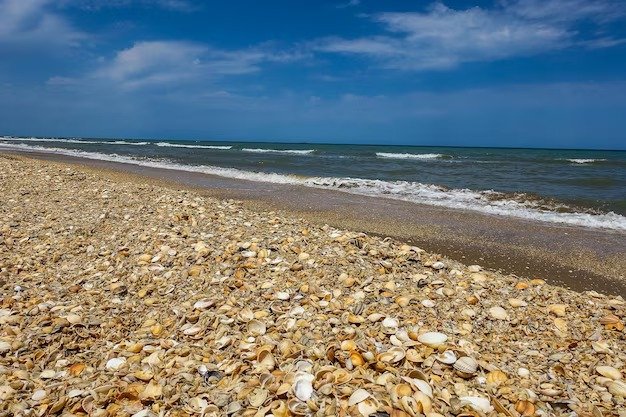
Russia’s Caspian coast is located in its southern region, particularly in Dagestan. The beaches here are less commercialized compared to Azerbaijan but offer a raw and natural experience. Derbent, one of the oldest cities in Russia, has coastal areas that combine historical exploration with beach relaxation. The Russian coastline is also home to unique ecosystems, with some areas being important for migratory birds and local wildlife.
Iran

Iran’s Caspian coastline stretches across its northern provinces, such as Gilan, Mazandaran, and Golestan. The beaches here are often surrounded by lush forests and mountains, creating stunning natural backdrops. Popular beaches like Ramsar and Bandar-e-Anzali attract both local and international visitors. Iranian beaches are known for their family-friendly atmosphere and proximity to traditional markets and cultural sites.
Kazakhstan

Kazakhstan’s western border includes a section of the Caspian Sea, particularly near the Mangystau region. The beaches in this area are still developing in terms of tourism infrastructure but offer an off-the-beaten-path experience for adventurers. Visitors can explore unique geological formations, like the Bozz Myra Canyon, along with enjoying the calm waters of the Caspian. The Kazakh coastline is also significant for its oil and gas industries.
Turkmenistan

Turkmenistan’s Caspian coastline includes beaches near the port city of Türkmenbaşy and the Awaza Tourist Zone. The Awaza area has been developed into a resort destination, featuring luxury hotels, spas, and recreational activities. These beaches are part of the country’s efforts to promote tourism, offering a blend of modern amenities and serene landscapes. Turkmenistan’s beaches are often quieter, providing a more private experience for travelers.
Is swimming allowed in the Caspian Sea?
Swimming is allowed in the Caspian Sea and is a popular activity, especially on Azerbaijan’s beaches. The water is typically calm and warm during the summer, making it perfect for swimming and other water activities. While the Caspian Sea is a saltwater body, it is less salty than the ocean, but you may still notice a salty taste while swimming.
For safety, it’s best to swim in designated areas with lifeguards or clear instructions about the water’s condition. Be sure to check any local rules or restrictions before swimming, as some beaches may have specific guidelines.
What are the best beaches on the Caspian Sea?
Bilgah Beach
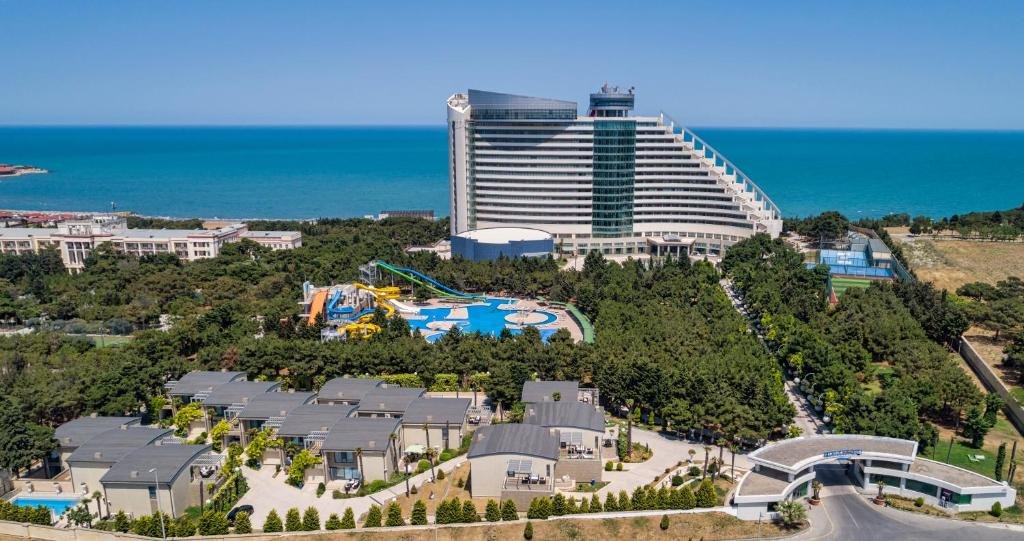
Located near Baku, Bilgah Beach is a popular spot with both locals and tourists. It features sandy shores, calm waters, and a mix of public and private areas. It’s perfect for swimming, sunbathing, and enjoying beachside cafes.
Shikhov Beach

Shikhov Beach, just outside Baku, offers a relaxed atmosphere with clear waters. The beach has both free and paid areas, and it’s popular for water sports and leisurely walks along the shore.
Mardakan Beach

This beach is known for its quiet, peaceful environment, making it ideal for those seeking a more private and relaxing experience. It’s less crowded than other beaches but still offers comfortable facilities.
Sumgait Beach

Located in the city of Sumgait, this beach is known for its wide shoreline and gentle waves. It’s an excellent spot for families, with parks and picnic areas nearby.
Novkhani Beach

A family-friendly beach, Novkhani is close to Baku and offers a laid-back vibe with good amenities, including cafes and rest areas. It’s a great place to enjoy the sun and swim in the Caspian Sea.
Overview of Caspian Sea Beaches in Azerbaijan
Azerbaijan’s Caspian Sea beaches are known for their unique combination of natural beauty, welcoming climate, and diverse recreational opportunities. The shores of the Caspian Sea offer a variety of beach experiences, ranging from lively, well-equipped spots to more tranquil, less crowded locations.
These beaches are characterized by their clean, sandy shorelines and gentle waves, making them ideal for swimming and relaxing under the sun. The warm climate, especially in the summer months, adds to the appeal, with temperatures often reaching into the high 30s°C (90s°F), perfect for beachgoers looking to escape the hustle and bustle of city life.
In addition to the natural beauty, the beaches in Azerbaijan are easily accessible, particularly from Baku, making them a convenient choice for both local residents and international tourists. The scenic views of the Caspian Sea and the surrounding landscapes, including nearby resorts, parks, and picnic areas, further enhance the charm of these beach destinations.
Whether you prefer a lively atmosphere with beach clubs and restaurants or a quiet retreat in nature, Azerbaijan’s Caspian Sea beaches cater to all kinds of visitors, making them a top choice for a beach holiday.
Best Times to Visit

Seasonal Breakdown
- Summer (Peak season): The summer months, from June to August, are the peak season for visiting the Caspian Sea beaches in Azerbaijan. During this time, the weather is hot and sunny, with temperatures often exceeding 30°C (86°F). This is the best time for those who enjoy lively beach vibes, water sports, and a bustling atmosphere. Many local events and festivals also take place during summer, adding to the excitement of the beaches.
- Spring and Autumn: For a more peaceful and relaxed beach experience, spring (April to May) and autumn (September to October) are ideal times to visit. The weather is still warm but more comfortable, with temperatures ranging from 20°C to 25°C (68°F to 77°F). These seasons are perfect for those who prefer quieter beaches, fewer crowds, and pleasant temperatures for outdoor activities like hiking or beach walks.
Tips for Travelers
- Packing Essentials: When heading to the Caspian Sea beaches, don’t forget to pack sunscreen, swimwear, comfortable shoes, and a hat to protect yourself from the sun. If you’re visiting in the summer, light, breathable clothing and sunglasses are also recommended. For spring and autumn, bring a light jacket or sweater for cooler evenings.
- Avoiding Overcrowded Times: To avoid the crowds, plan your visit during the shoulder seasons of spring or autumn, or try to visit the beaches early in the morning or late in the afternoon, when they are less crowded. If you prefer a more tranquil experience, try to avoid weekends during peak summer months.
What is the water quality like at Caspian Sea beaches?

The water quality at Caspian Sea beaches varies depending on the location, but generally, the water is considered safe for swimming, especially along Azerbaijan’s beaches. Many of the popular beach areas, such as Baku, Nabran, and Mardakan, are well-maintained and offer clean water suitable for recreation.
However, like any large body of water, the quality can be affected by factors such as weather, pollution, and local environmental conditions. During the peak summer season, some areas may experience a rise in water temperature, which can lead to lower oxygen levels in certain parts of the sea, potentially affecting water quality.
In general, it’s advisable to check the water quality before swimming, especially in less developed or remote beach areas. Local authorities and beach operators often monitor water quality and provide updates to ensure safety. It’s also important to avoid swimming in areas near industrial or port zones, where water quality may be compromised.
Are Caspian Sea beaches family-friendly?

Many Caspian Sea beaches in Azerbaijan are ideal for families, offering a range of activities and amenities suitable for all ages. With calm and shallow waters, these beaches are safe for children to swim and play. Popular beaches like those in Baku, Nabran, and Mardakan feature facilities such as restrooms, shaded areas, and restaurants, making them comfortable for families to enjoy.
In addition to swimming, families can partake in activities like beach sports, picnics, and boat rides. Some beaches even have playgrounds and recreational spaces for children, enhancing the family-friendly environment.
While the beaches are generally safe, it’s always a good idea to supervise young children near the water, as conditions can change with the weather and tides. Overall, the relaxed atmosphere, gentle waters, and family-oriented amenities make the Caspian Sea beaches in Azerbaijan a great destination for family vacations.
Environmental concerns about visiting Caspian Sea

Visiting Caspian Sea beaches in Azerbaijan can be a wonderful experience, but there are some environmental concerns to keep in mind. The Caspian Sea has faced various environmental challenges, such as pollution and habitat degradation, which can affect the quality of the beaches and water.
- Pollution: Industrial activities around the Caspian Sea, including oil extraction and shipping, have contributed to water pollution. Some beaches may show signs of littering or pollution, which can affect the cleanliness of the area. It’s important for visitors to dispose of waste properly and avoid contributing to the environmental burden.
- Water Quality: Although many beaches in Azerbaijan have clear and relatively clean water, some areas might still experience reduced water quality due to pollution runoff or local industries. It’s a good practice to check water quality updates, particularly during peak seasons.
- Conservation Efforts: The Azerbaijani government has been working on improving the environmental condition of the Caspian Sea region, including cleaner beaches and preserving local wildlife. Some beaches are part of protected areas that are maintained for ecological balance, and visitors are encouraged to respect local rules and regulations regarding conservation.
By staying informed, being mindful of environmental impact, and following local guidelines, visitors can help protect the natural beauty of the Caspian Sea beaches for future generations.
Caspian Sea water type
The Caspian Sea is a saltwater lake, making it the largest enclosed body of water in the world. However, its salinity is much lower than that of oceans, with salt content varying across different regions. The water is generally calm, especially along the coastlines of Azerbaijan, and is suitable for swimming and other recreational activities. Despite its lower salinity, it still provides a unique experience compared to freshwater lakes.
Visa Requirements for Visiting Caspian Sea Beaches
A visa is required to visit the Caspian Sea beaches in Azerbaijan for many nationalities. However, Azerbaijan has an e-visa system available for a number of countries, which simplifies the process. To ensure smooth travel, check the latest visa requirements on official government websites or contact the embassy before planning your trip.
Unique Wildlife and Natural Attractions Near Caspian Sea Beaches
The Caspian Sea is home to a variety of wildlife and natural attractions, particularly along the Azerbaijani coast. Visitors can spot migratory birds, including flamingos and pelicans, and the Caspian seal, one of the rarest seal species in the world, can be seen in certain regions.
Azerbaijan’s coast also features beautiful natural landscapes. Gobustan National Park, with its mud volcanoes and ancient petroglyphs, is nearby and offers a unique exploration experience. In addition, there are nature reserves along the coast where visitors can enjoy hiking, birdwatching, and experiencing a blend of desert and marine ecosystems. These areas are perfect for those who love nature and wildlife.
Accommodation Options Near the Beaches
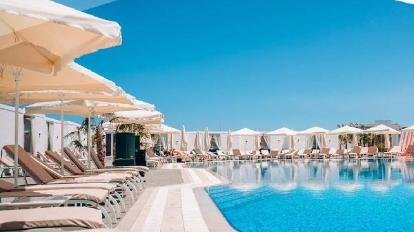
Luxury Stays: For a luxurious experience, the Bilgah Beach Hotel is one of the most popular upscale resorts in Azerbaijan. Located along the Caspian Sea, it offers top-tier amenities, private beach access, and a variety of recreational activities.
Mid-Range Options: There are several comfortable and budget-friendly hotels near the Caspian Sea beaches, such as the Caspian Riviera or Park Chalet, which provide great value without compromising on quality. These hotels offer spacious rooms, scenic views, and access to the beach.
Local Guesthouses: For a more authentic experience, consider staying at local guest houses in nearby towns like Mardakan or Shuvalan. These guest houses provide a cozy, homely atmosphere and a chance to experience local culture and hospitality.
How to Get There
From Baku: The beaches along the Caspian Sea are easily accessible from Baku, the capital of Azerbaijan. By car, the drive typically takes 30 minutes to 1 hour, depending on the specific beach. There are also public transport options, including buses and taxis, that can take you to popular beaches like Bilgah or Mardakan.
Regional Tips: When navigating local routes, taxis are a convenient option for tourists, but it’s advisable to confirm prices upfront. If you prefer public transportation, buses are available from the city center to beach areas, though schedules may vary. Consider renting a car if you plan to explore multiple beaches or regions for greater flexibility.
The Azerbaijani side of the Caspian Sea is home to some of the most stunning and easily accessible beaches in the region. Whether you’re seeking a lively beach atmosphere or a quiet spot to unwind, you’ll find a place that suits your needs. With its combination of natural beauty, modern amenities, and rich culture, visiting these beaches offers a truly memorable experience.
FAQ About Caspian Sea Beaches
Are Caspian Sea beaches safe for swimming?
Yes, most beaches have designated swimming areas with lifeguards on duty, ensuring safety for visitors.
What should I pack for a beach trip?
Essentials include sunscreen, swimwear, water shoes, a hat, and light clothing to stay comfortable under the sun.
Are there restaurants near the beaches?
Yes, many of the beaches feature cafes and seafood restaurants offering a variety of local dishes, perfect for a relaxing meal by the sea.
Can I visit Caspian beaches in winter?
While swimming isn’t ideal due to the cold temperatures, the beaches are still scenic and offer a peaceful retreat for those who enjoy the winter atmosphere.
Do I need to book accommodations in advance?
During the peak summer months, it’s highly recommended to book accommodations in advance to secure a spot at your preferred beach resort or hotel.


